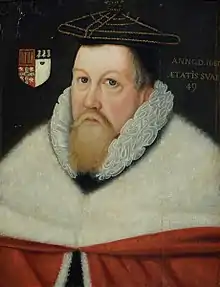John Richardson (translator)
John Richardson (born Linton, Cambridgeshire, c. 1564 – 1625) was a Biblical scholar and a Master of Trinity College, Cambridge from 1615 until his death.

Life
He was born ‘of honest parentage’ at Linton, Cambridgeshire. John Richardson matriculated as a sizar from Clare College, Cambridge in 1578,[1] where he graduated B.A. in 1581.[2] He was afterwards elected to a fellowship at Emmanuel College.[1] He proceeded M.A. in 1585, B.D. in 1592, and D.D. in 1597.[2]
In 1607 he was appointed Regius Professor of Divinity, in succession to Dr. John Overall.[2]
In 1609 he was appointed Master of Peterhouse before accepting in 1615 the same position at Trinity.[1]
Some notes of his Lectiones de Predestinatione are preserved in manuscript in Cambridge University Library (Gg. i. 29, pt. ii.). He and Richard Thomson were among the first of the Cambridge divines who maintained the doctrine Arminianism in opposition to the Calvinists.[2] He resigned in 1617 as a results of increasing anti-Arminian pressure.[3] He then served in 1617 and 1618 as vice-chancellor of the university.[1]
Richardson was a skilled hebraist and he served in the "First Cambridge Company", charged by James I of England with the translation of the books of the Old Testament from the Books of Chronicles to Song of Songs (comprising most of the Ketuvim) for the King James Version of the Bible.[2]
At his death, Richardson left a bequest of £100 to Peterhouse.[2]
Notes and references
Citations
- "Richardson, John (RCRT578J)". A Cambridge Alumni Database. University of Cambridge.
- Cooper 1885.
- Coffey 2006, p. 25. John Overall, Regius Professor of Divinity from 1595 to 1607, denied the doctrine of the inevitable perseverance of the saints. His successor, John Richardon, appears to have held Arminian views on both perseverance and election, and resigned in 1617 as a results of increasing anti-Arminian pressure.
Sources
- Cooper, Thompson (1885). "Richardson, John (d.1625)". Dictionary of National Biography, 1885-1900. 48. London: Smith, Elder & Co. pp. 227–228.CS1 maint: ref=harv (link)
- Coffey, John (2006). John Goodwin and the Puritan Revolution : Religion and Intellectual Change in Seventeenth-Century England. Woodbridge: The Boydell Press.CS1 maint: ref=harv (link)
Further reading
- McClure, Alexander. (1858) The Translators Revived: A Biographical Memoir of the Authors of the English Version of the Holy Bible. Mobile, Alabama: R. E. Publications (republished by the Marantha Bible Society, 1984 ASIN B0006YJPI8 )
- Nicolson, Adam. (2003) God's Secretaries: The Making of the King James Bible. New York: HarperCollins ISBN 0-06-095975-4
External links
| Academic offices | ||
|---|---|---|
| Preceded by John Overall |
Regius Professor of Divinity at Cambridge 1606–1617 |
Succeeded by Samuel Collins |
| Preceded by Robert Some |
Master of Peterhouse, Cambridge 1609–1615 |
Succeeded by Thomas Turner |
| Preceded by Thomas Nevile |
Master of Trinity College, Cambridge 1615–1625 |
Succeeded by Leonard Mawe |